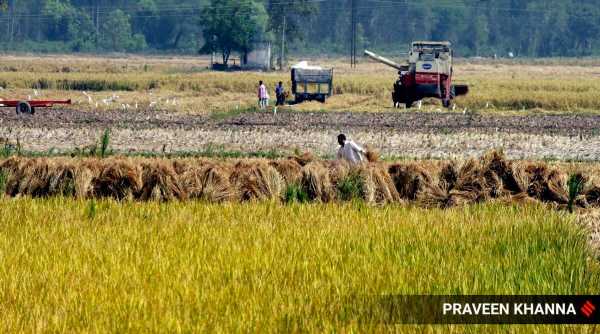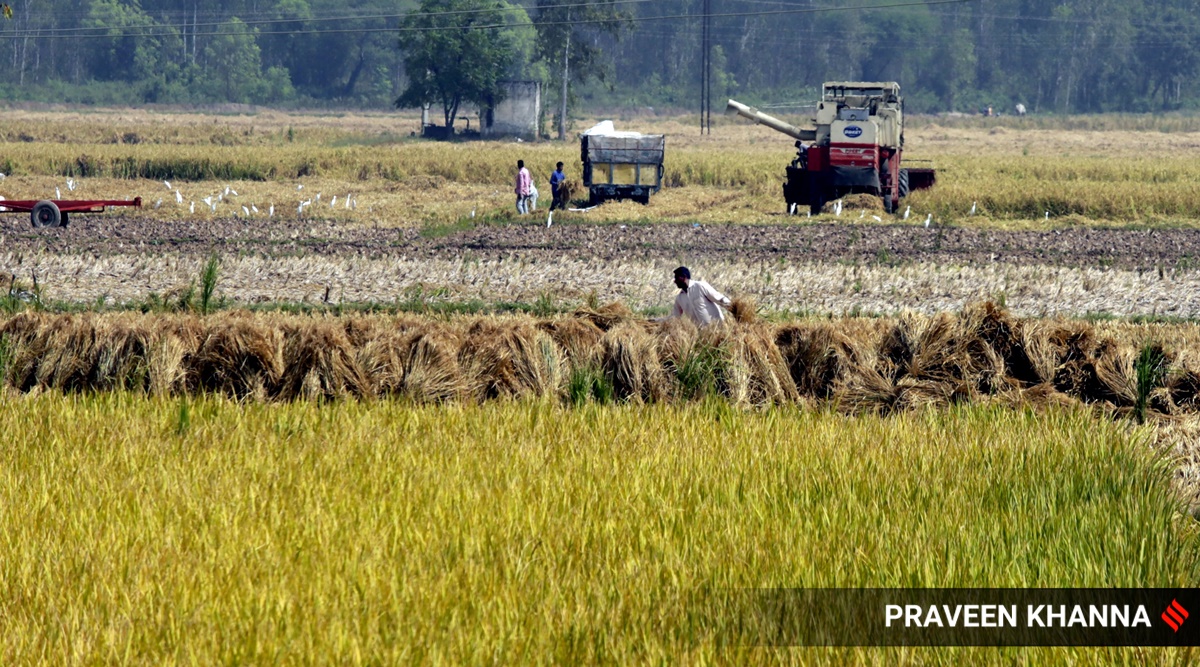The MSP increase ahead of the kharif season was approved by the Cabinet Committee on Economic Affairs, chaired by Prime Minister Narendra Modi.
With the monsoon announcing its arrival, the government Wednesday increased Minimum Support Prices (MSP) for all mandated kharif crops for marketing season 2021-22.
The sesamum MSP has been raised 6.59 per cent — the highest among all crops — while in the case of paddy, the principal kharif crop, the increase in floor price is 3.8 per cent.
The MSP increase ahead of the kharif season was approved by the Cabinet Committee on Economic Affairs, chaired by Prime Minister Narendra Modi.
Briefing reporters on the Cabinet decision, Agriculture Minister Narendra Singh Tomar said the MSP of paddy (common) has been increased from Rs 1,868 per quintal to Rs 1,940 per quintal for 2021-22 — a hike of Rs 72 per quintal.
In the kharif marketing season (KMS) 2020-21, MSP of paddy (common) had seen an absolute increase of Rs 53 per quintal. In percentage terms too, the increase in paddy (common) MSP for 2021-22 is higher than the previous year. Last season, an estimated 1.20 crore paddy farmers availed the MSP.
Among all crops, the lowest increase in MSP is in the case of maize — 1.08 per cent, up from Rs 1,850 per quintal to 1,870 per quintal for 2021-22. Last year, maize MSP had seen a hike of 5.11 per cent.
In the case of moong, a major pulse crop, the MSP increase has been 1.10 per cent — from 7,196 per quintal to Rs 7,275 quintal. Last year, moong MSP was increased 2.07 per cent.
The soyabean (yellow) MSP has been increased 1.80 per cent, up from Rs 3,880 per quintal to Rs 3,950 per quintal. Last year, the soyabean MSP was increased 4.58 per cent.
For KMS 2021-22, the MSPs of sunflower seed and ragi have been increased by 2.21 per cent and 2.49 per cent, respectively.
In percentage terms, the highest increase in MSP, 6.59 per cent, is in the case of sesamum — from Rs 6,855 per quintal to Rs 7,307 per quintal. The groundnut MSP has been increased by 5.21 per cent –from Rs 5,575 per quintal to Rs 5,550 per quintal. Tur and urad floor prices have also gone up 5 per cent.
The bajra MSP has been increased 4.65 per cent — from Rs 2,150 per quintal to Rs 2,250 per quintal. However, in percentage terms, the bajra MSP hike is lower than last year when it was hiked 7.5 per cent. The cotton (medium staple) MSP has been raised 3.8 per cent.
An official statement said: “The differential remuneration is aimed at encouraging crop diversification.”
“The increase in MSP for Kharif Crops for marketing season 2021-22 is in line with the Union Budget 2018-19 announcement of fixing the MSPs at a level of at least 1.5 times of the All-India weighted average Cost of Production (CoP), aiming at reasonably fair remuneration for the farmers,” it stated.
“The expected returns to farmers over their cost of production are estimated to be highest in case of bajra (85%) followed by urad (65%) and tur (62%). For rest of the crops, return to farmers over their cost of production is estimated to be at least 50%,” it stated.
Agriculture Minister Tomar, referring to apprehensions expressed by farmer leaders and the Opposition amid the ongoing protests against three farm laws, said: “When the (agriculture) reforms were taken up, there were many apprehensions about MSP. I had said in the House, Honourable Prime Minister had also assured the country that MSP is there and MSP will continue. Accordingly, MSP for rabi and kharif have been declared continuously. So, there is no need for anyone to have any apprehension. MSP is there, MSP is increasing. Procurement on MSP is also increasing.”
The government, Tomar said, has “full respect” for farmers and will hold discussions with them whenever they are ready.
“But we have repeatedly said that they should rationally point out objections to the provisions (in the farm laws). We will listen respectfully and we will also solve it,” he said.
Asked if the government had any fresh offer to resume talks with farmers, Tomar said, “Each time they came for talks, we made a concrete offer to them… Even on the day the talks failed, we made an offer to them to keep the farm laws in abeyance and discuss these in detail. If they find fault in these laws, we will definitely resolve that. I think it was a big proposal in itself. Despite that, they did not accept the offer, it is unfortunate.”
Source: Read Full Article



